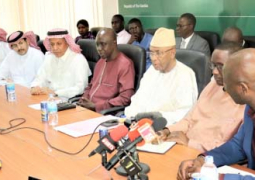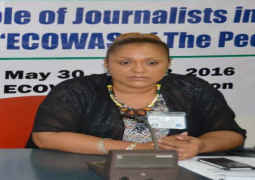The annual report and financial statement of the Independence Stadium has highlighted, among others, the deplorable state of the Friendship Hostel and tracks at the stadium, which it said is not in compliance with IAAF standards, and thus cannot host international events.
The report, which was presented before members of the Public Accounts and Public Enterprise Committees of the National Assembly by Mr Musa Njie, General Manager of the stadium last Thursday, said this is due to the fact that the running tracks are totally worn out.
In presenting the report, Njie said the Independence Stadium including the Friendship Hostel was built by the Chinese government in 1983 as a grant to the Government of The Gambia. He noted that, since then, the tracks have never been resurfaced, until in 2009 when they embarked on a project to resurface the running tracks.
According to him, the main objective of these institutions is to cater for sporting activities for both local and international events, and to also offer boarding and lodging facilities to athletes, youth groups, visiting tourists, conferences and workshops and accommodation.
"Friendship Hostel is facing some enormous problems, since there are other hotels within the same area that have taken a lot from the Friendship Hostel. Gone are the days when the hostel was very vibrant. Since the emergence of these hotels with the luxurious amenities they have in terms of hosting conferences, most of our clients have gone. But nonetheless, we at the Independence Stadium and Friendship Hostel are trying to keep the place as vibrant as possible," he said.
Since the establishment of the Independence Stadium and Friendship Hostel 27 years ago, he added, the two institutions have never been refurbished, and that has really retarded the progress.
He revealed that in collaboration with the International Amateur Athletics Federation, Gambia National Olympic Committee and the Ministry of Youth and Sport, an Italian engineer from one MONDO company was sent to the country to work with the stadium management in order to run a feasibility study on the re-surfacing of the tracks.
"The study was conducted within four days, and the outcome was successful. The result for the study was sent to IAAF, which has been endorsed and work would start soon," he stated.
The Independence Stadium general manager further stated that, for the mere fact that they want to be in compliance with FIFA as far as the main stadium bowl is concerned, they do not want to encourage non-sporting activities at the stadium, as far as
"FIFA normally sends an inspector to come and check the compliance factors at the Independence Stadium i.e. grass, pavilion, toilets, and the dressing rooms. If we encourage too many non-sporting activities at the stadium, it would be to our detriment, because we can be reprimanded for not being in compliance with standards," Njie told deputies.
He highlighted, among others, some of the constraints facing the management of the stadium, which he added include high utility bills and annual salary increment.
He recommended for the hostel to be refurbished as it is the main source of revenue for the Independence Stadium.
"We also recommend that running tracks be put in all the existing mini stadiums in the country," he said, noting that if this happens, it would reduce the burden on the Independence Stadium.
"Another recommendation is for the Independence Stadium to be closed from all activities, at least for four to six weeks every year, so that the relevant maintenance can take place," Njie further stated.
The chairman board of directors of the Independence Stadium and Friendship Hostel, Alhaji Kebba Njie, highlighted some of the concerns raised in the report, citing the damage done to the facility, and the issue of subventions which he noted has been reduced drastically, and affects the ability of the management to undertake certain responsibilities.
Read Other Articles In Article (Archive)
Jokor Westfield an Entertainment Ground
Feb 6, 2009, 5:06 AM



